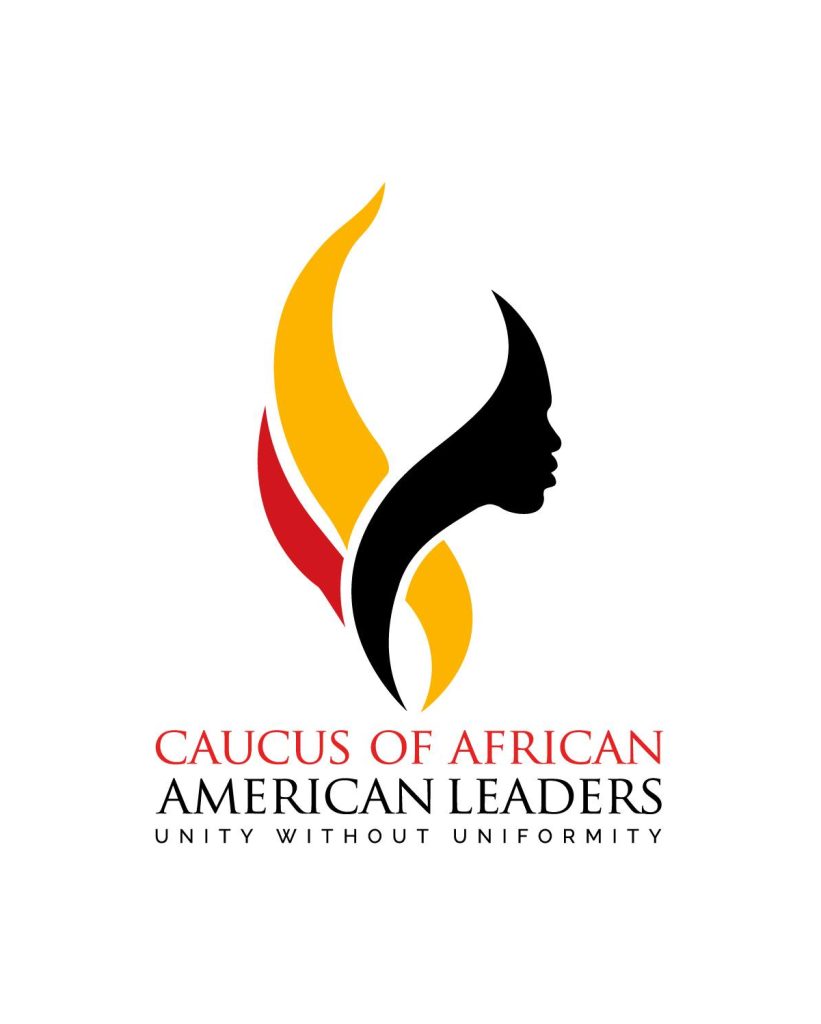
Going Far Together: Spotlighting the Caucus of African American Leaders
Every community has its changemakers. Even if they don’t make it to national news, there is always someone working tirelessly to make things better for their communities.
Through our state partners at March On Maryland, we get to work with some of the most experienced civil rights leaders and organizations in Annapolis and Anne Arundel County, Maryland. One of these organizations is the Caucus of African American Leaders of Anne Arundel County (CAAL). Established in 2011, the Caucus “emerged out of a pursuit to inspire and support the community, and a desire for actions to speak louder than words.”
The Caucus is led by convener Carl Snowden, a well-known civil rights activist from Annapolis, and consists of members from all walks of life, from business owners to religious leaders to community organizers. Every Caucus member is determined to find unity without uniformity, and to make America better, not bitter.
In honor of Black History Month, we wanted to highlight the many activists, community members that make up the Caucus.
But organizations like the Caucus of African American Leaders don’t just work during Black History Month: they work all year round fighting for their communities and and addressing systemic racism. Now that BHM is over, we encourage you to seek out the local changemakers in your area – attend local events and civic meetings, or look for groups you can join online.
Learn more about the Caucus through their website, and “Like” their Facebook page for future events and livestreams!
Tell us a little about yourself: who are you and what do you do outside of the Caucus?
Juanita Cage Lewis, Founding Member:
My name is Juanita Cage Lewis. I’m a resident of Maryland, living in Anne Arundel County. I’m an employee of the State of Maryland, proudly serving our citizens.
Bishop Antonio Palmer, Member:
I’m a bishop in the Lord’s church. I’m also the president of the United Black Clergy of Anne Arundel County.
Sharon Brown, Member:
I am a BIPOC professional living in Montgomery County, MD. I work for the US Department of Homeland Security (DHS) and support my community through volunteerism in the East County Citizen Advisory Board (ECCAB). I am also the founder of a not-for-profit organization called Black Enterprise Resource Center (BERC).
Edward York, Member:
My name is Edward York and I am young professional re-entering the field of politics and public service.


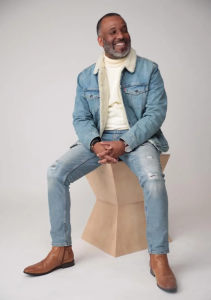
(From left to right) Caucus Convener Carl Snowden, Founding Member Juanita Cage Lewis, & member Bishop Antonio Palmer.
When did you join the Caucus? What inspired you to join?
Juanita Cage Lewis, Founding Member:
Being a founding member of the CAAL, it was formed in 2011 based on the need to make change in our county and state. At the time, some unjust issues came up and a small group felt it best to confront these issues in an orderly manner with the creation of our non-profit organization.
Anonymous, Member:
2015. I was inspired to be associated with an organization that addresses equality and equity issues.
Anonymous, Member:
Joined in 2020. I wanted to meet like-minded people to help the community, using my skills.
Bishop Antonio Palmer, Member:
Sometime in 2020. I was inspired by the unified effort of CAAL around issues important to our community.
Sharon Brown, Member:
I was introduced to the Caucus by Tony Spencer through Vince Leggett, Blacks of the Chesapeake. My concern is for CARR Beach and its impact on BIPOC history, especially the vision for its development…
I was inspired to join recognizing a coalition of BIPOC members with the same mission and purpose as myself and my organization, supporting the many elements in the evolution of BIPOC equity.
Edward York, Member:
I joined when it was brought to my attention by Carl Snowden because I believe that it serves an important purpose and a cause that warrants the full attention and devotion of members of our community who are willing to affect true change and betterment for our people.
What are your main responsibilities with the Caucus?
Bishop Antonio Palmer, Member:
I’m just a servant willing to help in any area that I can lend a voice to. No set responsibilities other than hosting the weekly Statewide Equity Meeting via Zoom. Also, to ensure that the faith community is abreast of challenging issues that the Caucus is fighting.
Anonymous, Member:
Members and I participate as necessary and able.
Sharon Brown, Member:
Attendance and reporting status.
Anonymous, Member:
Offering my information sources on grants, job postings and identifying opportunities that could be used in the different counties where Caucus members are located. As an example: MD 529 $500 supplement for students, business development support services available across the state.
Edward York, Member:
At this point I am just an entry-level member so I have been attending events such as the Tyre Nichols protest and press conference and lending my support to our brothers and sisters who need it such as Marylin Pierre.
What role do you think the Caucus plays in the Annapolis & Anne Arundel County community?
Bishop Antonio Palmer, Member:
It is a leading voice of advocacy in our region – very important role.
Anonymous, Member:
Addressing the issues of inequity.
Sharon Brown, Member:
The Caucus plays a role beyond the Annapolis and Anne Arundel County community since it is a place to combine resources.
Anonymous, Member:
It tries to raise the consensus of the community of issues, demonstrations on wrongs and sometimes push on legislation bills.
Juanita Cage Lewis, Founding Member:
The Caucus plays a very important role in our community. We tend to take on issues of importance that others don’t want to touch.
Edward York, Member:
I think the Caucus plays an important role in helping to organize and sustain our community in a unified and forward-facing direction.
Anonymous, Member:
The organization makes Annapolis and Anne Arundel County governments accountable to the community – especially people of color – by having a seat at the table.

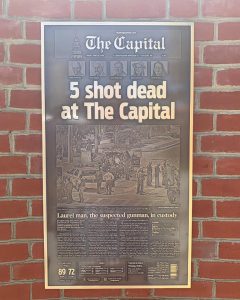
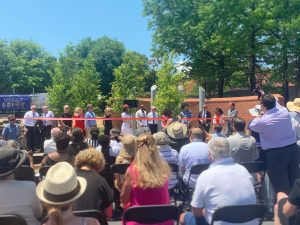
(June 28, 2021) Dedication of the “Guardians of the First Amendment Memorial”, which honors the five victims of the Capital Gazette shooting in 2018. The memorial was the idea of Founding CAAL Member Juanita Cage Lewis. CAAL itself played a key organizing role in the Memorial’s installation.
How does white supremacy manifest in Anne Arundel County?
Bishop Antonio Palmer, Member:
In a myriad of ways- too many to enumerate. Most importantly, economic inequities I think is the number one issue. There is a lack of effective policy and support centered around helping People of Color economically, from food deserts to unaffordable housing.
Anonymous, Member:
White Supremacy is manifested the the “Corporation of Racism” (employment, business, education, housing, religion, and everyday life).
Edward York, Member:
White supremacy manifests itself in every facet of our society including Anne Arundel through the rules and traditions by which we all abide, those who establish and enforce what we know as our societal mores, and by ensuring that the status quo remains upheld and resistant to change.
Anonymous, Member:
In police matters, housing, and human services.
Sharon Brown, Member:
I am not familiar with Anne Arundel County, however the manifestation of white supremacy is not centralized to one are of MD. It rears as an evil burden to the nation’s civilized society of humans. It is the main ingredient in social discourse, malfeasance, morality, destruction, and with disregard for human life across borders. It impacts quality of life , environment, education, proper medical care, and reasonable decision making.
Juanita Cage Lewis, Founding Member:
Sadly, white supremacy is alive in Anne Arundel County. Many aren’t in formed groups but strongly feel non-whites aren’t worthy of being Americans. They don’t care if you were born here or if you transported legally. Many of these folks are incognito and smile in your face daily. In addition to being anti-Black, anti-immigration, anti-Muslim, and homophobic. Plus, they are also virulently antisemitic.
What are some of the biggest challenges that the Caucus faces in creating systemic change and eradicating white supremacy?
Anonymous, Member:
The self-hatred in communities of color exacerbated by generational trauma.
Juanita Cage Lewis, Founding Member:
It’s very hard to change and eradicate white supremacy. Look at how far back it goes, then take a look at 2023. Many will deny that it exists.
As my mother would always say “Not much has changed.” Look at the small-framed, uneducated but very smart and articulate Negro woman, who fought for voters’ rights and equal justice. Yes, I’m speaking about Ms. Fannie Lou Hamer. In her own way she basically said, begin with eliminating poverty, then racial wealth gap, investing in people of color, create stricter discrimination laws… too many to list.
Edward York, Member:
I feel like both Maryland and America as a whole are not very conducive to change that defies, weakens or undermines the power of our oppressors but that the Caucus, by employing power in numbers, can be utilized to overcome these challenges.
Anonymous, Member:
The challenge the Caucus faces is choosing leaders who believe in and practice anti-racism.
Anonymous, Member:
Having access to decision makers and getting commitment to make the change. They are not going to eradicate white supremacy.
Sharon Brown, Member:
Strategy to stand unified with all organizations across Maryland, and creating consistent performance measurements forward.
What do you think are the Caucus’ biggest accomplishments?
Bishop Antonio Palmer, Member:
Galvanizing people for this last election cycle.
Anonymous, Member:
The Caucus’ biggest accomplishments are:
1. standing together as a solid unit, and
2. realizing that aggravation will be used if necessary to resolve the many disparities that continue to plague our communities.
Sharon Brown, Member:
I am only recently a member, however, I appreciate the support provided to one of our member’s defense against a threat to her license to practice law.
Anonymous, Member:
Increasing awareness among members in the different counties to the need to work together to address issues and be proactive in the community. Also getting plaques and acknowledgment of Afro American accomplishments.
Edward York, Member:
In my short time as a member, the biggest accomplishment I have seen was the outpouring of support and dramatic increase in visibility that was provided for Miss Pierre during her court hearing.
Anonymous, Member:
Partnering with other community organizations and local government to accomplish share goal and objectives.
Juanita Cage Lewis, Founding Member:
The Caucus’ accomplishments are listed at our website. We want folks to visit it at www.aacaal.org.

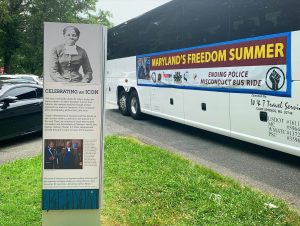
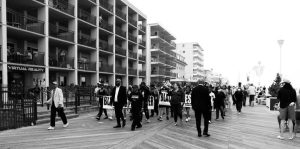
(July 19, 2021) Photos from the Maryland Freedom Summer Bus Ride, co-organized by the Caucus. Two full buses traveled from Annapolis to Ocean City to protest several incidents of police brutality on the Ocean City Boardwalk. The top photos are from the stop in Cambridge, MD at the Harriet Tubman Memorial Garden; the bottom is from the final stop in Ocean City, where part of the group marched down the Boardwalk.
What is the most important thing you’ve done with the Caucus?
Juanita Cage Lewis, Founding Member:
I’ve participated in many as all have done. I must say most current for myself is the Guardians of the 1st Amendment Memorial, downtown Annapolis. The Memorial was erected in honor of the five “Capital” newspaper employees, who were shot and killed by a lone gunman on June 28, 2018. One was a dear friend of mine, Ms. Wendi Winters. When this happened, I immediately phoned our Convener Mr. Carl Snowden and said we must do something to honor them.
Edward York, Member:
I think that being a part of the press conference for Tyre Nichols’ death alongside the police chief and NAACP leader is among one of the most important things I have don with the Caucus.
What is one goal you think the Caucus can achieve within the next five years?
Bishop Antonio Palmer, Member:
Economic growth for People of Color in our county.
Anonymous, Member:
Work with leaders on the national, state, county and city levels to embrace and address change in inequities.
Sharon Brown, Member:
Creating Unity BIPOC across and demonstrating as a modern example for persistence and consistency.
Anonymous, Member:
Create a viable working relationship with the Hispanic community thereby doubling the input and influence the organization has on how decisions are made that impact community.
Edward York, Member:
My hope is that the Caucus can help to achieve meaningful criminal justice reform so that Black men and women like George Floyd, Tyre Nichols, and Breonna Taylor will not have lost their lives in vain and so that people like me can live a peaceful existence without constant fear and worry of injustice.
Do you believe that local police accountability has improved, remained the same, or gotten worse since the murder of George Floyd? What about nationally?
Bishop Antonio Palmer, Member:
Remain the same both locally and nationally, although we have had a milestone with the police reform bill.
Anonymous, Member:
Some small battles have been touched on, but follow through will determine their success. Police accountability starts in the recruiting process, where leadership must start at the top: practiced, monitored, re-evaluated and re-visited to be successful.
Sharon Brown, Member:
While some accountability has been reported, we have many more rivers to cross.
Anonymous, Member:
I thing it has improved since Floyd but still has a ways to go… There are pockets of real improvement but the right wing and long term attitudes are so ingrained, indicate that we have along way to go.
Juanita Cage Lewis, Founding Member:
On a national level not much accountability has been shown. In Tennessee a statement was recently sent to the nation. Locally, yes there has been improvements…
Anonymous, Member:
It has improved somewhat because of body worn cameras but there is a long way to go – especially on a national level and with federal law enforcement departments such as the US Marshal service.
Edward York, Member:
I am not sure about locally, but I do feel like nationally it has remained the same if not gotten worse. President Biden has not passed the George Floyd Justice in Policing Act of 2021 despite campaigning on it, nor has he brought any meaningful change that would help the Black community like free community college or raising the federal minimum wage to $15 as promised.
Education and increase in real wages are among the greatest changes that can be made to positively impact our community, but I feel like a lack of ex-post facto accountability has rendered his promises moot, even after we delivered him the Democratic nomination in South Carolina and the US Senate not once, but twice in Georgia Senate elections. We must do more to hold our elected leaders accountable after they get in office.
I also feel as the the scope of conversation with regard to criminal justice is intentionally limited to factors of training and funding rather than underlying systemic and historical issues such as modern police forces being borne out of the fugitive slave patrols and having evolved only nominally from these distasteful origins.
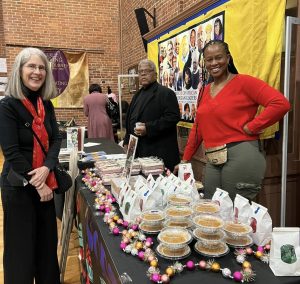

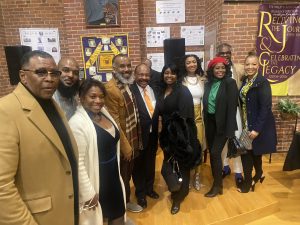
(December 13, 2022) The Caucus’ Annual Christmas Bazaar, featuring Black-owned businesses from throughout Anne Arundel County.
What are your thoughts about the future? Where do you see our country going?
Bishop Antonio Palmer, Member:
I’m always optimistic; as long as we keep fighting for right, change will come. Our forefathers proved that.
Anonymous, Member:
Unless we address the current murders of Black and Brown people, equitable employment, fair loans for housing and overall racial redlining, we are a doomed nation…
Juanita Cage Lewis, Founding Member:
Just my option, but all need to focus on the Kirwan Commissions’ Blueprint for Maryland’s Future.
Anonymous, Member:
At this stage in my life, the future is fine. It will be difficult for the young people in terms of jobs, economy, housing, discrimination in promotions. Things seem to be trending toward confrontations between the haves and have nots and the right vs the left.
Anonymous, Member:
We are at a critical point because of the anticipated backlash that is expected during the next election. We must prepare now by reaching out to the community and encouraging them to appreciate the importance of each vote.
Edward York, Member:
I am cautiously optimistic for the future as I feel like things can possibly change but that we must do a ton of work to make sure that they actually DO change. Things won’t get better unless we make them better.
In terms of racial equity, where do you historically see Maryland falling?
Bishop Antonio Palmer, Member:
Maryland is at a stagnant place with law enforcement and the justice system.
Edward York, Member:
I see Maryland as doing better in some respects than other states, particularly many of those in the South, and I think that the election of a Black governor will help facilitate more equality as well
Anonymous, Member:
Maryland will fall short, unless if leaders admit that our most northern Southern state has the same issues as many deep Southern states. Intentional change starts at the top.
Anonymous, Member:
Maryland is not even on the list because its track record is so bad.
Juanita Cage Lewis, Founding Member:
Our state is very diverse today. We still show issues with inclusion and equality. I believe we still have segregation with our school systems. Look at the differences in a Montgomery county then Baltimore City. The same applies with housing.
Sharon Brown, Member:
The jury is still in deliberations.
What is one truth you find is not well-known?
Anonymous, Member:
Racism is a Corporation that is been allowed to prosper.
Sharon Brown, Member:
We don’t know what we think we know, and the facts are not always clear.
Juanita Cage Lewis, Founding Member:
A fact ~ Sometimes the normally right thing to do is also the economically smart thing to do.
Bishop Antonio Palmer, Member:
Not many African American-owned businesses are MBE certified.
Anonymous, Member:
The one truth that I find is still not well-known is that the concept of race is a social construct.
Edward York, Member:
I find that many Americans today do not know or are not fully aware of the plight of the Black man in modern society. I feel as though many think the major problems have been solved and that there is not much work left to be done.
What is one story from Anne Arundel County or Maryland history that you think you should taught to everyone in the country?
Edward York, Member:
I think that more people should know about Lord Calvert’s initial decision to allow and enforce slavery in St. Mary’s Colony and to declare all arriving non-Christian Africans as well as their children to be legally-bound slaves essentially in perpetuity.
Juanita Cage Lewis, Founding Member:
About the little girl in western Maryland who integrated school before Ruby Bridges. Her story isn’t about disrespect for Ms. Bridges. It’s about where her white teachers felt Norman Rockwell got his idea from for his famous painting “The Problem We All Live With”.
Anonymous, Member:
There are so many – one that always give me pause is that for many years pregnant women were not allowed to deliver in the local hospital.
Bishop Antonio Palmer, Member:
The hidden history of Hebrews who were enslaved during the Diaspora, and their link to African American history and identity.
Anonymous, Member:
How enslaved people built this country, have always contributed to society without true representation from our leaders.
A few of the Caucus’ members and Elders:
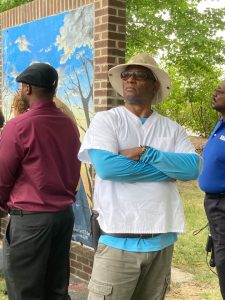

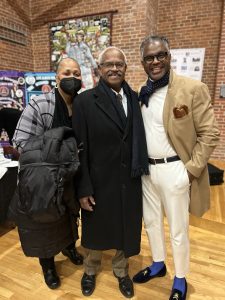
(From left to right): Lewis Bracy acting as security during Maryland’s Freedom Bus Ride; Elder Charles James with keynote speaker Congressman Bennie Thompson at the 35th Annual MLK Awards Dinner; Judge Vickie Gipson, Thornell Jones, & Todd Powell at the Caucus’ 2022 Christmas Bazaar.



Members & Elders during the Maryland Freedom Bus Ride. (From left to right) Former AAC Branch NAACP President Jacqueline Allsup, Adetola Ajayi, & Dee Goodwyn at the stop in Easton; Elder Larry Diggs & Priscilla Monroe at the starting point in Annapolis; Rabbi Randy Curtis leading chants during the march down the Ocean City Boardwalk.
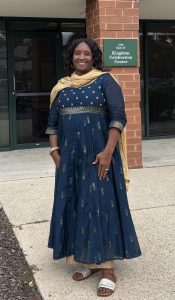
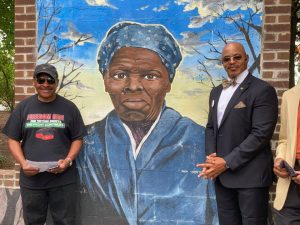
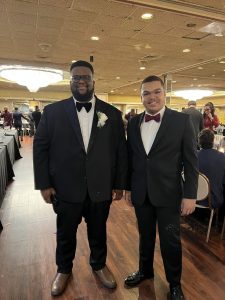
(From left to right) Dr. Barbara Palmer at a joint press conference with CAAL and the United Black Clergy; Convener Carl Snowden & Dave Grogan during the Maryland Freedom Bus Ride; Vincent Moulden & Drake Smith at the 35th Annual MLK Awards Dinner.
Credit for some of these photos goes to CAAL Member Dee Goodwyn, who you can always count on to capture the moment.
